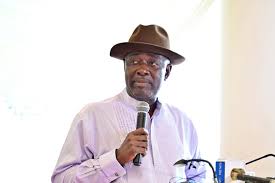
"Refineries will establish Nigeria as a major world power."
Nigeria would become a worldwide superpower, according to Heineken Lokpobiri, Minister of State for Petroleum Resources (Oil), if local refining capacity is developed.
He delivered a speech at the Crude Oil Refinery Owners Association of Nigeria's inaugural summit (CORAN). "Making Nigeria a Net Exporter of Petroleum Products" was the summit's theme.
The future of Nigeria's oil refining sector and its capacity to promote both economic expansion and energy security were topics of discussion during the summit.
The theme of the summit, according to Lokpobiri, who was represented by Engineer Kamoru Busari, Director Upstream, Ministry of Petroleum Resources, was both relevant and vital since it gave participants a vital forum to investigate Nigeria's midstream and downstream oil and gas industries, promoting self-sufficiency in refined petroleum products.
"The development of refineries is not solely about infrastructure; it encompasses energy security, economic expansion, and establishing Nigeria as a worldwide leader in refining," said Lokpobiri.
"This is a pivotal moment in our history," CORAN Chairman Momoh Oyarekhua said in his opening remarks, highlighting the summit's importance in transforming Nigeria's energy landscape. Our goal is to become a refining powerhouse instead of just an importer.
Oyarekhua gave an overview of Nigeria's refining history, emphasising the country's early achievements in setting up important refineries.
But problems like unstable crude supplies and ineffective government have stunted the country's progress, making Nigeria reliant on imported refined goods. Utilisation is still low even with an established refining capacity of 1.122 million barrels per day (BPD), which includes recent additions like the Dangote Refinery.
In order to revitalise the industry, CORAN suggested a comprehensive plan that included unifying the value chain, enacting legislative changes, assuring a sustainable feedstock supply, and encouraging new refinery investments.
Through its chairman, Abdulrazaq Isa, the Independent Petroleum Producers Group (IPPG) praised government actions aimed at modernising the refining sector and boosting domestic output, emphasising the value of utilising Nigeria's enormous hydrocarbon resources.
Given its abundant hydrocarbon resources, Nigeria shouldn't be importing crude oil to meet its domestic refinery feedstock needs. To safeguard our energy future, it is imperative that we unlock the much-needed incremental production of petrol and crude oil, according to Isa.
During the event's supper, ND Western Vice Chairman Layi Balogun gave the keynote lecture and stated that the CORAN Summit was essential to Nigeria's future in the oil sector.
In addition to energy security, Nigerians also require affordable and readily available energy. We would be walking on eggshells if we could only do one without the others, according to Balogun.
In the future, CORAN hopes to diversify income sources, create jobs, and make Nigeria a net exporter of petroleum products. The group promised to get together again the following year to review developments and expand Nigeria's refining sector.
According to him, the Crude Oil Refinery Owners Association of Nigeria is committed to supporting and advancing the growth of the refining sector in Nigeria. He said that CORAN is dedicated to helping Nigeria become energy independent and to promote economic progress by increasing the country's capacity for refining.





